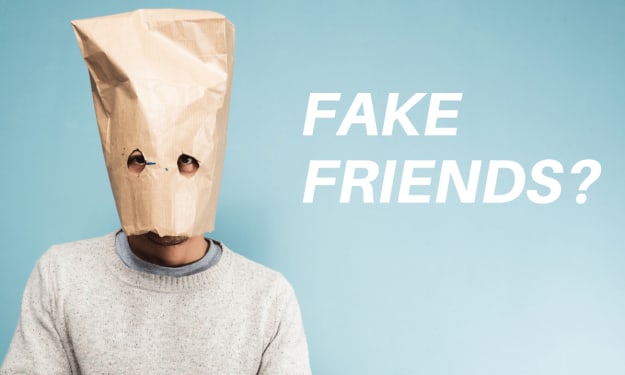Why It’s Important to Be Able to End a Friendship That Drags You Down
In a world in where new opportunities for communication appear everyday, it is effortless to get involved in a friendship that will lead you to nothing.

Friendship is a genuinely important part of life, and having people around as a support group is not only nice, but it’s also incredibly beneficial to one’s mental health.
On the contrary, if a friendship is asymmetrical, or only serves to drag you down, it can have quite an antagonistic effect. Just like anything else that makes life unnecessarily difficult, it’s a situation that must be addressed. Many times, if a relationship isn’t mutually satisfying to all parties involved, the best course of action is to end it. This can be difficult, but it’s also worth it to do what’s best for you personally because a relationship that isn’t good for anyone isn’t worth your health.
Knowing When to End It
Knowing when to end a detrimental relationship is the first step of being able to do so. After all, some people are difficult to deal with, but they aren’t necessarily people that need to be cut out of someone’s life. So at what point does someone realize that a companionship has become too taxing to continue, and when does it cross the line from doable into something that needs to be cut off? There are a few signs to watch out for.
They aren't supportive.
A friend is meant to support you, not bring you down. Take a student, for example. If they are working on an essay and they ask someone to proofread, there could be a show or lack of support in the way that they respond to that situation.
If the student’s writing skills are low, a genuine friend would tell them or point them towards help such as a platform where you can have an essay written for you. Someone who isn’t as supportive may not help at all or even make fun of the student. If behavior such as this is repetitive, questions are likely to be raised about the value that person brings to the student’s life.
It is also common for these types of people to put others down—sometimes solely for the chance to do it and sometimes to build themselves up.
The world revolves around them.
If someone around you is constantly talking about themselves, it is a pretty good sign that the level of care they have for you isn’t as high as it should be. Behavior such as this becomes particularly problematic when it overruns anyone else they are around. Maybe they can’t wait for the people around them to quit talking to give them a chance to center the conversation on them or maybe they don’t even go that far and consistently interrupt people to do the same thing.
Talking about ourselves is part of human nature. In fact, venting one’s own emotions can be incredibly therapeutic and healthy. The point when this become problematic, though, is when one person’s domination or steering of conversation towards their own life overruns everything else constantly.
It's exhausting to be around them.
There are a million ways that an unhealthy companionship can manifest but, at the end of the day, it all comes down to how someone makes the people around them feel. In a healthy relationship, there may be tiring days or interactions, but for the most part, everyone enjoys their time together most of the time.
In a negative relationship, the good and enjoyable interactions are few and far between. This, in the long run, can lead not only to the loss of the hours spent together but according to Keck Medicine of USC, it can lead to poor health as well in the form of not only mental, but physical health problems.
What to Do About These Relationships
After all is said and done, ending any relationship—even a poor one—is an extremely difficult thing to do and it can be complicated. For many, simply telling someone to “go away” or never talking to them again can lead to guilt no matter how badly they treat you. In these cases, there are some steps that can be taken to taper off interactions rather than putting a cold turkey stop to them.
Set boundaries.
If you’re in a toxic situation, odds are it isn’t a part-time affair, and they probably want to be around a lot and call for a rather large part of your attention. To put a stop to this, the first step to making the best decision for yourself is setting boundaries.
This can be done in a few different ways. Some people feel confident enough to sit down with the person in question and set clear boundaries. For others, on the other hand, direct confrontation can be a problem—especially if the person they are dealing with is argumentative. In these cases, it can be useful to reduce the time it takes to answer them to show them that the world isn’t at their beck and call. If they text you, as an example, don’t answer immediately every time or don’t be afraid to say you’re busy when they call and ask to hangout.
Look to other friends.
This is an especially important step if the person that’s being cut off runs in the same circles as you, so don’t be afraid to involve other, closer friends in the decision by letting them in on what’s going on. As mentioned before, it can be hard to step away from any type of relationship and there’s no shame in looking for support. Even if they don’t decide to make the same choice of cutting that person out, they can help by reducing how often they invite both of you out.
Odds are if someone is being overbearing with you, they might be to other people as well.
In the end, the most important thing to remember as you navigate this situation is that you’re wellbeing matters. It’s important to be able to take steps like these to ensure that there isn’t negative energy dragging you down.
About the Creator
Jilian Woods
Slowly but surely influencing on your consciousness by using magic words in my writings






Comments
There are no comments for this story
Be the first to respond and start the conversation.